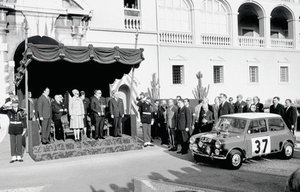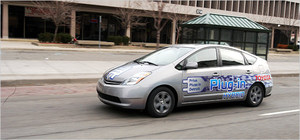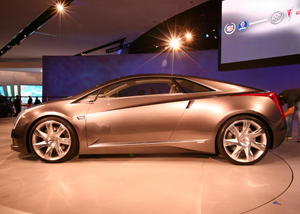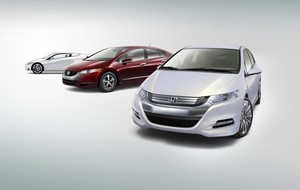
This past week, one of my editors at the Huffington Post asked me to explore, for a video project he was working on, the relative "greenness" of the Toyota Prius gas/electric hybrid versus the BMW Mini Cooper.
Then it occurred to me: What's a green car, anyway? The Prius is the "star of our green show" these days, and while the Mini may be green enough for most folks, and damn cute, too, it's also full of style, fun and performance. Owning a Prius, though, isn't exactly like having a Formula 1 car in your driveway.
We're all hung up on "green" when it comes to our cars, and car-makers tell us we have plenty of green vehicles to choose from. Well, at least greener than they used to be.
Renault-Nissan and Mitsubishi both made major EV announcements last week (I posted a piece on it), so it's going to be more difficult for high-mileage gasoline engine-makers like Mini, hybrid-makers like Toyota and clean-diesel car-makers like Mercedes to make strong "green" claims once EVs start hitting showrooms in a big way. Which looks it may be a lot sooner than any of us thought.

The racing year 1964 went down as particularly memorable. Paddy Hopkirk and his co-driver Henry Lidding powered to a Monte Carlo Rally victory in a Mini Cooper S, to the astonishment of the rest of the field and the racing fraternity. This initial Mini victory was repeated in the following year and in 1967, but it's the first victory that sticks in the mind. The Grimaldi clan of Prince Ranier, Princess Grace and the rest greet the winning car. The win established the Mini as both racing and styling legend; there are few designs which remain absolutely contemporary year in and out without major changes, and Mini is one of them.
The "greenness" decision between Prius and Mini, and any other cars one might want to compare, ultimately is still more about opinion than hard fact, and that's because people are emotional about cars.
It's possible that if someone crunched all the objective numbers from the 2009 Mini Cooper and Prius (and all the numbers we'll use are from the base versions of the cars) some computer somewhere might have the balls to say which is greener.
But because those specifications supplied by BMW and Toyota are "interpreted" by various government agencies which provide more of a subjective result, then the rightly-derided "automotive enthusiast press" has their go at it and finally even those "results" and "conclusions" are evaluated by an emotional public ("Well, sure the Prius MUST be greener! It's a hybrid, after all!"), you can see the difficulty in coming up with a good, hard answer to: "What's the greenest car?"

This and other 2010 Prius plug-in hybrid concepts have been running around the US getting millions of real-world miles of driving experience. Of course, only this one has been used so heavily in promoting the new car.
In 2009, the facts are that there might not be a vehicle worthy of that title. "Green" is just another automotive marketing term which the public is beginning to see through. Took us over a decade to see the BS in SUVs and how they were sold to us ... This time around, "green" better start meaning something real.
Comparing the greenness of a Chrysler 300 and a Tata Nano might be an easier assignment - but even then, you'd still have to find two people to agree on what "greenness" is in the first place. There is no "official" definition.
Both Mini and Prius depend on gasoline, which to me makes them both pretty ungreen.
Seems if we can buy, starting in 2011, a pure plug-in rechargeable EV for $25K, one which offers more than 100 miles per two-hour charge, the green label loses a lot of luster when applying it to cars still using fossil fuels.

About a year ago, Chrysler showed these EV concepts based on some of their existing models. Currently, the company makes no EVs or even a gas/electric hybrid; whether these EVs will ever see production, even if Fiat takes over Chrysler, remains a big question mark.
Here are some hard numbers, from the base Mini Cooper and Toyota Prius for 2009:
Prius' 1.5 liter gas/electric hybrid powerplant makes a not-exactly-throbbing 76 horsepower, 82 ft. lbs of torque and uses an automatic-like CVT transmission (fewer than 5% of all cars and trucks sold in the US are ordered with standard, stick-shift transmissions).
Because electric motors exhibit all their torque immediately, Prius and its ilk are fun driving for the first 100 feet after the light turns green. After Prius beats that Porsche for the first two seconds of the Stop Light Grand Prix, hybrids settle down into a driving torpor; you better feel good about saving some gas, because there's little else about driving to enjoy with most of today's hybrids.
Mini Cooper uses a slightly larger engine than Prius, an all-gasoline four-cylinder unit 1.6 liters in size which makes 118 horsepower and 114 ft. lbs. of torque. The base car use a conventional six-speed standard (stick shift) transmission.

Mini's Clubman estate wagon stretches the mini-Mini from two doors to six and challenges some of the better carrying capabilities offered by Prius; Mini has also been showing EV versions of their cars, but actual production, even by a giant company like BMW, remains a highly-costly and questionable proposition in this economy - And what must come first? EVs or a smart power grid? And doesn't one without the other defeat the purpose of such a project?
Both are front-wheel drive. Prius is EPA-rated as a midsize car, Mini as a microcompact (so Prius can haul more stuff while using less gas).
Mini averages a combined 29mpg, in-town and on-highway, Prius a hearty-for-today 46. Prius can get 493 miles on one tank of gas; Mini 345. Prius weighs 2,932 pounds, Mini 2,546 (so there's more "stuff" making-up a Prius, all of which has to be dealt with when the car is "recycled").
Prius is a five-door hatchback design; base Mini a two-door coupe (the new Mini Clubman ersatz "estate wagon" makes a Mini bigger inside and out, but Clubman is pricey, too, with fewer mpg than our base Mini).
Mini Cooper's base MSRP is $18,550.
Prius base-price's at $22,000.
Mini's EPA "Annual Petroleum Consumption" is estimated at 10.7 oil-filled barrels, about 449.4 gallons. It produces 5.7 tons of CO2 annually, says Our Government, and rates a 6 on the EPA Pollution Score, a scale of 1 to 10, 10 being the best.

Cadillac's Converj concept uses the same kind of "extended-range gas/electric hybrid system" developed for the Chevrolet Volt. Volt has the official backing of General Motors, and reports from Detroit last week have the Converj added to Caddy's near-term production pipeline; don't expect either car to go into production within the next two or even three years.
Prius uses 7.4 barrels of oil a year, about 310.8 gallons annually. It produces 4 tons of CO2 annually, and rates an 8 on that EPA Pollution Score.
Cars built in Europe (like Mini) are mandated to be made with a much higher recyclable content than those made in Asia or the US. This gives Mini a bit of a lead over Prius in that department. But true greenness can shine through when comparing the actual materials used in the cars. Metals, woods, glass, cotton and wool and plastics of all kinds are their basic building blocks, but cars using more easily-recycled versions of all that content will find themselves in a greener category. These days, that often means the Euro-made car has the green advantage because of the continent's tougher recycling laws.
Bottom line: Common sense would tell us that the Prius is probably the greener of the two. It gets 14mpg more on average than Mini, is larger inside and out, can haul more people and stuff, but it also weighs almost 400 pounds more than the Cooper; never a positive in the green world.
Prius has other drawbacks, too, especially when compared to the Mini's performance and overall excitement quotient.
The Prius image is greeny, but also boring and dull. I don't think those "qualities" necessarily have to go together. Why can't green cars be fun for people who love Corvettes and Ferraris, too??
Prius is slow, lumpy and looks like a high school auto shop project from the future (and just for the record, Honda's new Insight hybrid seems based entirely on Prius as far as styling, so Honda has nothing to crow about in that department, either).

Honda's new line of Insight hybrids owes a lot, perhaps too much, to Prius, when it comes to styling and size, inside and out. There must be more than one way to build high-mileage cars.
Mini, on the other hand, makes a lot more horsepower, has a much better suspension set-up, is infinitely more fun to look at and drive than Prius (or most any other car in any price range) and it's made by BMW, never a negative.
The numbers may tell one story, but because cars are still all about emotion, fun, sex and fashion, there's a large audience of drivers and car-buyers you'd have a hard time convincing that the Prius is "better" than the Mini, green factors considered or not.
Isn't "green" just another marketing scam when cars are still being powered by dead dinosaurs?
(This Saturday and Sunday April 18 and 19 - our live weekend automotive and motor racing WebRadio shows come to you from the 35th anniversary Toyota Grand Prix of Long Beach, the first time the open-wheel IndyCar racers have been consolidated into one organization at the Long Beach event in over a dozen years. We've got plenty of guests, background stories on the race and the racers (like Helio Castroneves beating federal tax evasion charges Friday in Miami and arriving in Long Beach Saturday to try and qualify a third Team Penske car for the Sunday race) and plenty more. Take part in the conversation by calling the shows at 213-341-4353. And join us by tuning-in live at 5pm Pacific time this (and every) Saturday and Sunday at www.TalkRadioOne.com)